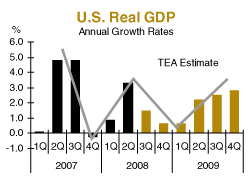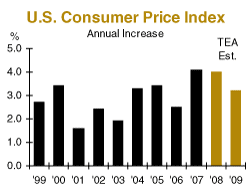|
September 17, 2008
Autumn View
Written by Jeff Thredgold, CSP, President, Thredgold Economic Associates
The U.S. Economy
…the big “W”
The current period of U.S. economic volatility seems likely to continue in coming quarters. A “W”-shaped period of economic performance seems underway (see chart).
 The official “scorekeeper” of the U.S. economy, the National Bureau of Economic Research, has remained silent to this point in regard to recession. In our view, an announcement that a recession likely started around the end of 2007 could come at any time. The official “scorekeeper” of the U.S. economy, the National Bureau of Economic Research, has remained silent to this point in regard to recession. In our view, an announcement that a recession likely started around the end of 2007 could come at any time.
Budget Deficits
…too much spending
A menu of weak U.S. economic growth (or likely recession), enormous war spending, one financial bailout after another, and Congressional economic stimulus could see the fiscal year (FY) 2008 deficit, which ends on September 30, exceed $400 billion. The budget deficit for FY2009 will likely be larger. As a percentage of GDP, however, various deficits in the 1980s and 1990s were even worse.
Unemployment
…more painful levels
The nation’s jobless rate reached 6.1% in August, a five-year high, and could move slightly higher in coming months. By comparison, the jobless rate averaged 4.6% in both 2006 and 2007.
U.S. employment has declined for eight consecutive months. However, longer-term labor shortages, especially for skilled workers, will remain center stage for years to come.
Inflation
…to move lower
The sharp decline in oil and other commodity prices of recent months, should it continue or simply stabilize, will help unwind much of the inflation pressures that pushed inflation to a 17-year high in recent months. Most forecasters expect the CPI to rise 3.6%-4.2% in 2008, with a smaller increase expected next year. We still see inflation pressures under control in coming years.
 The Federal Reserve The Federal Reserve
…sigh of relief
One can hear a distinct sigh of relief from Fed officials as the recent sharp decline in oil and commodity prices holds the promise of lower inflation pressures. The Fed is widely expected to stay on the sidelines in coming months. If U.S. economic performance deteriorates further, or if domestic and global credit markets freeze up again, the Fed will cut its key interest rate for an eighth time.
Conversely, solid evidence of U.S. economic stabilization and resumed growth will lead financial markets to expect modest tightening around year-end or early in 2009. In any event, the Fed will continue to provide enormous amounts of financial market liquidity as needed behind the scenes.
Home Prices
…approaching a bottom?
More signs of the beleaguered housing market approaching a bottom have emerged in recent weeks. However, those markets which recorded the largest gains in recent years still appear to have some additional downside. In addition, inventories of new and existing homes for sale are still too high.
The recent “takeover” of Fannie Mae and Freddie Mac by the U.S. Government has reduced the level of housing and credit market uncertainty in recent weeks, leading mortgage interest rates lower. Additional mortgage lending activity by traditional lenders would go a long way in boosting housing performance in coming quarters.
The Global Economy
…more slowing expected
Global economic performance clearly slowed during the past year, with high oil, commodity, and food prices wreaking havoc across the globe. Recent declines in these prices will benefit hundreds of millions of the global poor. Anxious global credit markets only added to the disarray. Such slowing follows five years of powerful global economic performance.
The Chinese economy, by various estimates about to pass the German economy as the world’s third largest (trailing only the U.S. and Japan), is enjoying the fruits of a successful Olympic Games experience. No shortage of work remains, however, to meet the needs of more than 1.3 billion people as they continue their evolution from the farm to the factory. As before, air and water pollution are serious problems.
The Japanese economy continues to struggle to find its way, with economic growth contracting slightly in 2008’s second quarter. The Japanese remain extremely wary of rising Chinese influence across Asia and the world.
Economic growth in India remains impressive. At the same time, however, enormous investment will be required in coming years to bring a largely antiquated transportation and societal infrastructure into the 21st Century.
The European economy has also slowed in recent quarters, with a modest contraction during this year’s April-June period. Prospects for coming quarters are also bleak as the Continent has suffered from global credit anxiety, weak housing markets, high energy and commodity prices, and the damage to exports and local tourism from the strong euro currency.
The European Central Bank (ECB), whose role is focused almost exclusively on inflation containment, will face enormous pressure in coming months to reduce its key short-term interest rate a time or two (or three) in an effort to stimulate the stagnant economy. Like other central bankers around the world, the ECB relishes the current weakness in oil and commodity prices.
Russia’s militaristic aggression in Georgia has heightened prospects of additional bullying moves in other former members of the collapsed Soviet Union. The global community has voted with its feet and funds in recent weeks, with sharp capital outflows and much weaker Russian stock market performance.
Russian Prime Minister Putin and President Medvedev continue to consolidate their respective power bases, with rising friction expected. Where energy prices go in coming months and years will be critically important to this major oil and natural gas exporter.
Vast Persian Gulf oil wealth continues to accumulate. However, many investors in massive commercial developments are increasingly anxious about additional declines in oil prices that could easily disrupt the investment “apple cart.”
Brazil continues to strengthen its hand in agriculture (especially soybeans), while a recent huge oil find will boost revenues. Other nations struggle with high taxes, enormous business red tape, and anxious credit markets.
The Canadian economy is dealing with its own period of lackluster performance. Mexican growth is reasonable, but needs to improve to provide workers more opportunities at home.
The Bottom Line?
U.S. economic performance will likely struggle in coming quarters before some expected improvement as 2009 matures. We also expect: a larger budget deficit…rising near-term unemployment…moderating inflation pressures…stable short-term interest rates…soft housing markets…and a slowing global economy.
• Email this article to a friend
• Learn about econAmerica, Jeff’s latest book
|
|
Subscribe to the Tea Leaf
Like what you just read? Have Jeff Thredgold’s Tea Leaf emailed to you free each week. Subscribe today.
|
|
|

“Tea”ser
Q: What is a recent economics graduate’s usual question in their first job?
A: Would you like fries with your burger?
• Send us a “Tea”ser

“Tea”stimonial
“The reviews that we received on your speaking performance were simply outstanding. It was imperative that you, as our first speaker, started the school off on a good note. You not only got us off to a great start, but the enthusiasm you generated carried right through to the end of school.”
—Richard H. Edinger, J.D., CLU, ChFC, CPA, AVP, Advanced Marketing, Lutheran Brotherhood Insurance Products Company
• More testimonials
Invite Jeff Thredgold to speak at your next conference, meeting, or client function
If you like the Tea Leaf, you’ll love Jeff Thredgold’s live presentations. Jeff takes your audience on a timely, engaging, and entertaining tour of the U.S. economy and financial markets. Debunking some of today’s most common economic myths, he offers a clear picture of how the American economy is really performing and what that means for the future of your finances.
• Watch video clips of a Jeff Thredgold presentation.
• Download more information that you can e-mail to other decision makers.
• See Jeff Thredgold’s speaking calendar.
• Tell us about your event using our online form and we will contact you. Or, is there an individual in your organization you would like us to contact?
• Give us a call at 1-888-THREDGOLD (847-3346) to ask about Jeff’s availability and pricing for your event, or for any other information.
|

